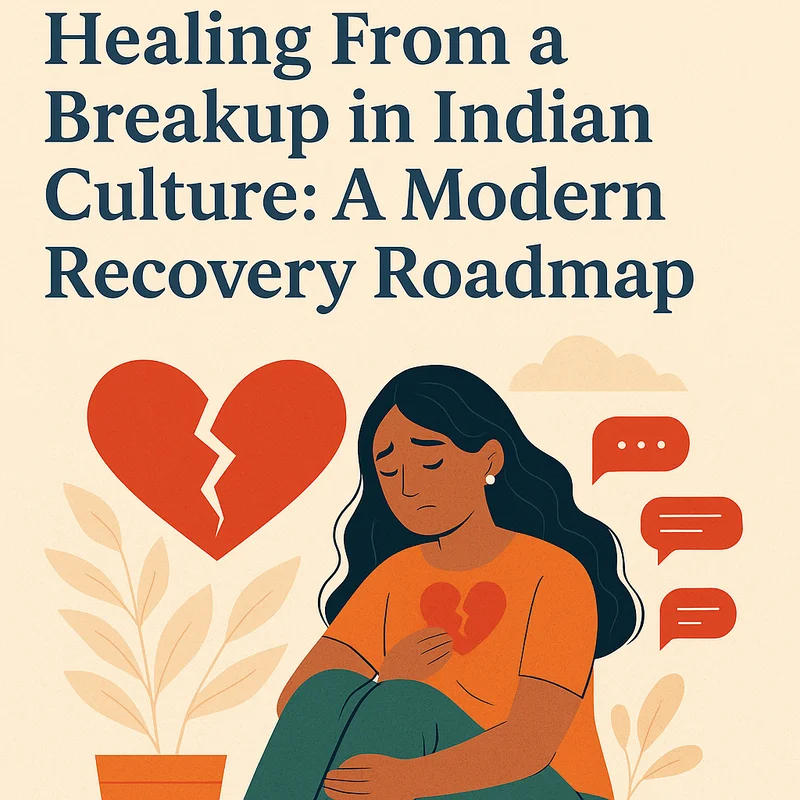
Introduction: Breaking Up in India — A Cultural Shift
Breakups can feel like the end of the world — especially in India, where love, marriage, and family ties run deep. Whether it’s the pressure of “log kya kahenge” or the guilt of letting down your parents, heartbreak in India often comes with layers of social baggage.
But times are changing. As modern relationships evolve, so too are the ways we heal. If you’re struggling to recover from a breakup, know that you can rebuild your life with strength, self-awareness, and cultural understanding. This recovery roadmap will guide you through the process — step by step.
1. Understanding Breakups in Indian Culture
In India, breakups are often more than just personal — they’re communal events, thanks to strong family and social networks. Here’s why heartbreak hits hard:
- Family Expectations: Parents may expect relationships to end in marriage, adding pressure.
- Arranged vs. Love Marriages: Navigating love relationships still feels rebellious in many circles.
- Social Stigma: The classic “log kya kahenge” factor — fear of gossip and judgment.
- Generational Divide: Older generations often see breakups as failures, while younger people are starting to normalize them.
Recent studies from Pew and India Today show Indian youth increasingly date on their own terms, but still face guilt and societal shame when relationships end.
2. The Emotional Stages of Healing After a Breakup
Healing from a breakup, no matter your background, tends to follow five predictable stages:
- Denial — “This can’t be happening.”
- Anger — “How could they do this to me?”
- Bargaining — “If only I had done X, maybe they’d stay.”
- Depression — Sadness, loss of interest, hopelessness.
- Acceptance — Finally letting go and looking ahead.
In India, these stages can be complicated by family and community opinions. Recognize your emotions. Allow yourself to grieve without shame. Indian therapists increasingly encourage acknowledging these feelings rather than bottling them up.
3. Practical Steps to Heal Your Heart and Mind
Here’s your actionable breakup recovery plan, modern yet rooted in Indian sensibilities:
✅ Journal your feelings — Write it down, release the burden.
✅ Lean on trusted friends or family — Choose people who will listen without judging.
✅ Mindfulness and meditation — Practices like yoga, pranayama, or guided meditation can ground you.
✅ Spirituality if helpful — Visiting temples, reciting mantras, or reading spiritual texts can soothe you.
✅ Seek professional help — Counseling is growing in acceptance. Helplines like iCall and YourDOST offer confidential, culturally aware support.
These steps remind you: healing doesn’t mean forgetting, it means growing stronger.
4. Coping With Social and Family Pressure Post-Breakup
For many Indians, family or relatives may ask endless questions. Here’s how to deal with them:
- Set boundaries: It’s okay to say, “I’d rather not talk about this right now.”
- Use polite scripts: “I appreciate your concern, but I’m focusing on myself.”
- Address parents’ disappointment: Remind them you deserve happiness, even if it takes time.
- Leverage modern supports: Peer groups, online forums, and even social media communities can help you feel less alone.
Prioritizing your mental health over social gossip is a crucial act of self-love.
5. Rebuilding Your Identity and Confidence
Breakups can leave you questioning your worth. Instead, see them as a chance to rediscover yourself:
- Reconnect with hobbies, passions, and old dreams
- Focus on fitness or career goals
- Build a personal growth routine
- Try dating again only if and when you feel ready
Studies show many young Indian adults find themselves thriving after breakups by investing in personal growth. Think of it as rewriting your own story.
6. When to Seek Professional Help
Sometimes heartbreak can spiral into a mental health crisis. Please seek professional help if you:
- Experience suicidal thoughts
- Cannot function for weeks or months
- Completely withdraw from daily life
Therapy is not a weakness — it is an act of courage. In India, affordable and culturally sensitive therapists are available through platforms like MindPeers, BetterHelp India, and local clinics.
7. Embracing a New Chapter: Your Recovery Roadmap
As you move forward, remember this journey is not linear. There will be setbacks, but each step is progress.
Quick recap:
- Understand cultural challenges
- Let yourself feel and process grief
- Follow healing routines
- Set boundaries against social pressure
- Seek help if needed
- Rebuild your identity with love and patience
Heartbreak is not the end — it’s a transition. You are free to heal, grow, and even love again.
Conclusion: Choosing Hope Over Heartbreak
In a country where heartbreak can feel doubly heavy, reclaiming your peace is an act of bravery. Breakups hurt, but they do not define you. Use this modern recovery roadmap to find hope, healing, and happiness — on your own terms.
Your story isn’t over — it’s just beginning. 🌟
FAQs About Healing From a Breakup in Indian Culture
Q1. Why are breakups so difficult in Indian culture?
Because Indian society often ties relationships to family honor, marriage expectations, and community opinions, making breakups emotionally and socially challenging.
Q2. Is therapy acceptable after a breakup in India?
Yes! Therapy is becoming more accepted, especially among younger Indians. Many mental health platforms offer culturally aware counseling.
Q3. How long does it take to recover from a breakup?
It varies for everyone, but research shows 3–6 months is common. Healing depends on your emotional support system and coping tools.
Q4. How do I handle family pressure after a breakup?
Set clear boundaries, use polite but firm responses, and remind family that your happiness is the priority.
Q5. Can spirituality help in healing heartbreak?
Absolutely. Many Indians find visiting temples, chanting, or practicing yoga brings peace and perspective during emotional distress.



